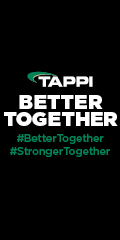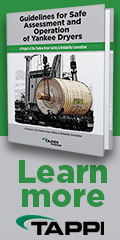
| Archive/Subscribe | TAPPI.org | Advertise | TAPPI Press Catalog | January 2021 |
Kimberly-Clark Reaches Agreement for Sale of Hakle Mill in Niederbipp, Switzerland
According to Fastmarkets RISI, Kimberly-Clark has found a buyer for its Hakle tissue mill in Niederbipp, Switzerland. The site will be sold to the entrepreneurial Queck family, which owns the sanitary paper specialists Cartaseta in Switzerland, Fripa Papierfabrik Albert Friedrich in Germany and Fabryka Papieru Czerwonak in Poland. The transfer to the new owners is scheduled for May 2021. Kimberly-Clark announced in November that it was in negotiations to sell the Niederbipp mill. The move is part of a wider program of improvements to the company's western European manufacturing operations, which also includes a $38 million investment in state-of-the-art equipment, technology and facilities at the group's mills in Rouen, France and Romagnano, Italy. "We are pleased to be able to take over the Niederbipp mill. It fits very well into our long-term strategy and ideally complements our other plants," Verena Queck-Glimm, the representative of the new owners, said in a statement. According to her, the Niederbipp facility will help expand the group's capacity, win new customers and offer the existing ones additional supply security. In order to handle the takeover, the new owners founded the company Lakana Holding. It is solely owned by the Queck family and will formally acquire the Niederbipp facility. The transaction comprises the entire paper mill and Kimberly-Clark's Tela brand. The Hakle brand or any other Kimberly-Clark brands are not part of the sale. While the takeover preserves the Niederbipp production facility and jobs, the new owners emphasized that maintaining sanitary paper production in Switzerland is a huge challenge. Their most important goal is to maintain and increase the competitiveness of the plant, which will require operational adjustments. "We believe in the location and are ready to invest in the plant," Queck-Glimm noted. She added that together with the responsible authorities and the social partners, the new owners will work to ensure that the necessary adjustments are made responsibly and, where possible, in a socially acceptable manner. According to Fastmarkets RISI's Asset Database, the Niederbipp mill can produce some 50,000 tpy of tissue on two machines. |



